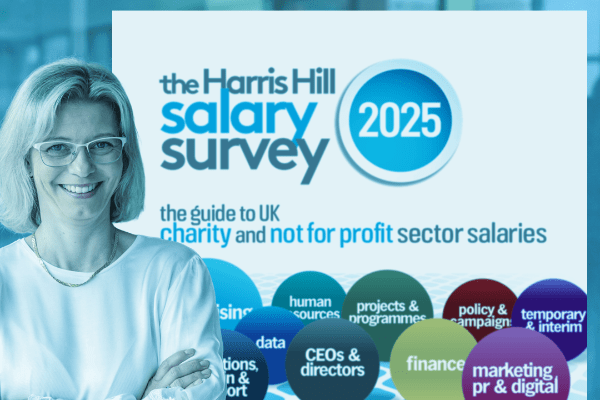
► Every so often in the press - usually once we've finished frothing about GCSEs being too easy/too hard but before we start panic-buying for the Worst Winter In 200 Years (again) - we're all invited to be incandescent about the salaries of charity executives. But while the wintry warnings are typically 99% nonsense based on a tiny titbit of truth ('Met Office says Carlisle to be bit chilly for fortnight in Feb'), are the stories of 'vast sums being pocketed by charity fat cats' any more accurate? In the past seven years, executive search director Jenny Hills has recruited more charity CEOs than you'd fit on any of the superyachts they're alleged to sail around in, so for our 2018 Salary Survey, we asked her for the truth behind the tabloid tales: what do charities really pay their chief executives, and just as importantly, why? Over to you, Jenny! |
Standard executive salaries
For roles at this level it's difficult to provide a meaningful or truly representative list of market rate salaries.
Firstly, non-executives in the sector very seldom receive salaries for their work. Secondly, for CEO roles, salaries vary wildly depending on the organisation. In the past year, we have placed CEOs on salaries of £45,000 to £100,000, and everything in between.
CEO salaries are dependent on the scale of the organisation, its complexity, location, geographical coverage, sector, regulatory requirements, as well as the particular challenges of the role.
For example, CEOs who are hired to turn around an organisation at risk of failure are often compensated for the additional work, compared to the same role at an organisation on a more even keel; or we often see higher salaries for CEOs who are expected to take on the lead fundraising role for their charity.
These multiple factors make setting useful categories for organisations and their CEO salaries more complex than we have space for here. However, a service we do provide is bespoke salary surveys for organisations looking to benchmark the salary of a particular role. For these pieces of work, we are able to focus in on, identify and interpret the data that is most relevant to your organisation and role, using all the criteria discussed above.
________________________
Pay and public perception
As ever, charity sector salaries are often a point of contention in the press and public consciousness, especially those paid to CEOs.
The myth of the typical charity executive being paid six figure salaries is just that - a myth. Of the 168,237 charities registered in England and Wales as of 31st December 2017, just over 0.5% of them had any employees earning £100,000 or more, according to official figures from Charity Financials.
Nevertheless, we regularly have conversations with boards looking to hire their next chief executive who are nervous about openly advertising the salary. To which our answer is always: are they worth it?
To really hone in on what trustees are looking for in their next CEO, we like to focus on the impact the board expects them to make. How is the organisation going to be different in one year, five years or ten years, if the new CEO is successful?
________________________
The shape of success
Most of the time, our CEOs are brought in to deliver significant change, such as dramatically growing a charity; turning around an organisation with tough challenges; or developing new services and income streams.
They need to do this in a highly regulated environment - always the Charity Commission, often CQC, Ofsted, the Fundraising Regulator, the Information Commissioner's Office, not to mention the oversight requirements of statutory and grant funding.
They are also often in the full glare of the public eye: think of the difference in profile between the CEO, for example, of your local hospice, versus the CEO of the average local commercial business of comparable scale.
At the same time, they need to lead on strategy for the organisation, manage its finances (often taking a large chunk of responsibility for bringing in the income in the first place), manage the staff and volunteers and any physical assets.
They need to be skilled negotiators, managing relationships with stakeholders from the life-long supporter to the actively hostile, so to dramatically understate things, it's a big job. The smaller the charity, the more hands-on they have to be. As well as leading the organisation, we know many CEOs who, when needs be, will literally stuff envelopes.
________________________
Setting the salary
Every charity CEO role is different, but it's safe to describe it as a job that most people could not do, and of those who could, many make use of their skills elsewhere in the public or private sector - for considerably higher salaries.
We will always help our clients to set the right salary - one that will attract the talent they need, and that also fits the organisation's circumstances. Sometimes this involves tough conversations about the board's expectations versus the salary budget, and advising on what can be done to stretch it further.
Options could include offering the role on a part time basis, or offering home or more flexible working. On a few occasions this year, we have secured a new CEO on a lower salary than the board were expecting.
________________________
Ultimately, once the decision to pay a given salary is made, the strongest argument against those who object to charity staff getting paid at all is the complexity and breadth of the job description. Charity CEO is a highly skilled professional position with exceptional demands, requiring a highly skilled professional with exceptional capabilities in order to be successful.
Jenny Hills, Chief Executive & Director Recruitment Practice, Harris Hill

A brief introduction to our Chief Executive & Director Recruitment Practice
Now a distinct and growing brand within Harris Hill, our executive team have been building a rock-solid reputation with charities around the country for exceptional service, a genuinely bespoke and consultative approach, and a record of successful executive and non-executive appointments that's unmatched within the sector.
Principally recruiting Chief Executives, Trustees and Chairs, plus SMT positions such as COOs, Senior Directors and Deputy CEOs, the team deliver superb results every time, thanks to their extensive candidate network, sector knowledge and search capabilities, coupled with an unwavering commitment to highly professional, diligent, ethical and inclusive recruitment practices.
► Chief Executive & Director Recruitment Practice
-

Opportunity for all
Find out how we’re working to deliver more diverse, equitable and inclusive recruitment…
-

Recruiting a charity CEO?
Our executive recruitment specialists have an exceptional record of successful CEO, chair, trustee and…
-

Charity sector salaries
Our 2025 Salary Survey has the latest rates and expert insight for roles throughout the sector.













